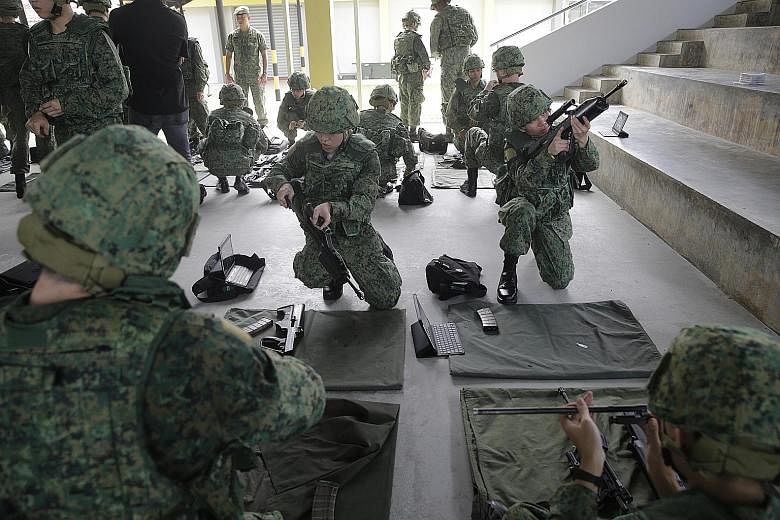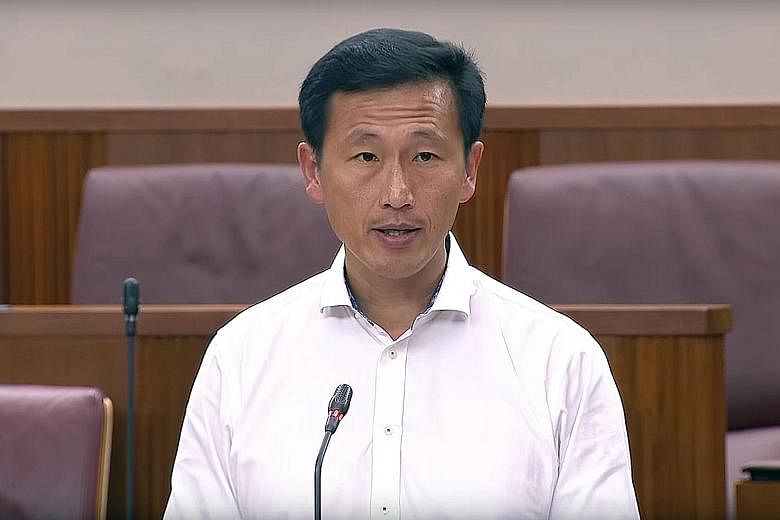A total of 23 courses conducted by the Singapore Armed Forces (SAF) are now accredited under the Workforce Skills Qualification (WSQ) scheme, a move aimed at giving national servicemen a leg-up in their future careers.
These courses include the Basic Military Training (BMT) for most recruits except for commando or naval diver trainees, the Ministry of Defence (Mindef) said yesterday.
In all, more than 96 per cent of full-time national servicemen (NSFs) who enlist from this January will receive the WSQ annually.
The move to accredit SAF courses under the WSQ is to recognise that servicemen attain leadership, technical and specialist skills that meet professional standards accepted by industries, Second Defence Minister Ong Ye Kung said yesterday in Parliament.
"In fact, the teamwork we learn in NS is very much better than most commercial courses on teamwork," he added.
The WSQ is a national training framework that trains and certifies individuals in skills that are valued by employers. Under the framework, workers gain qualifications ranging from certificates to advanced diplomas. Those who do not get a full qualification will get a statement of attainment (SOA) for each module they complete.
For instance, an NSF with a Physical Employment Status of A or B will get two SOAs under the Employability Skills WSQ framework after completing BMT.
Commanders will receive additional accreditation for their leadership skills. So, a naval officer will get a level three advanced certificate - level six is the highest WSQ qualification - under the Leadership and People Management WSQ framework after completing the Officer Cadet School course.
Mindef and SAF have been working with SkillsFuture Singapore to expand accreditation across the armed forces, said Mr Ong, who is also Minister for Education (Higher Education and Skills). Skills accreditation is one of several ways to improve the national service experience and deploy servicemen more effectively, he said, as Singapore marks the 50th anniversary of NS this year.
He also listed how the military would make its soldiers fitter and provide safer training, as he described servicemen as "our most precious resource in the SAF".
He announced a new Centre for Excellence for Soldier Performance that will be up by the end of the year.
It will focus on developing fitness regimes, soldier nutrition studies, injury prevention programmes, and rehabilitation regimes to help injured national servicemen recover. It will also look into enhancing the mental strength of soldiers.
The SAF is also looking at how to better deploy its manpower as technology advances, said Mr Ong.
He noted that combat engineers in the past had to lift and hold heavy loads to assemble a bridge, but their counterparts today can do so with the push of a few buttons, thanks to new hardware that makes use of a hydraulic arm.
Thus, the SAF has been reviewing vocation requirements in terms of fitness and abilities, said Mr Ong, without elaborating.
He also updated the House on a review of the SAF's safety system by an external panel of safety experts that began in October 2013.
The panel completed its work recently and reported that the SAF's health and safety system is internationally one of the best, he said.
But there are also a few areas for improvement, such as the need to strengthen safety culture in SAF units and further promote open reporting of near-miss incidents.
The SAF has accepted the panel's findings and will improve on these areas, Mr Ong said.



